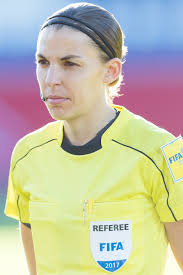
Introduction
Stephanie Frappart has emerged as a pivotal figure in the world of football, not only for her skill and expertise as a referee but also for her role in breaking gender barriers within the sport. Her appointment as the first woman to officiate a major men’s football match is not merely a historical milestone but a significant step toward inclusivity in a traditionally male-dominated field. Frappart’s trailblazing career continues to inspire a new generation of female referees and athletes, making her story increasingly relevant in today’s sporting landscape.
Breaking Through in a Male-Dominated Field
Frappart’s journey began in France, where she started officiating local matches before making substantial strides in her career. In 2019, she became the first female referee to officiate a Ligue 1 match, marking an important moment not just for her but for women in football across the globe. Her credible performance caught the attention of the international football community, leading to further opportunities, including her selection for prominent tournaments.
2022 was a landmark year for Frappart as she made headlines by officiating in the FIFA World Cup in Qatar. This not only solidified her status as a top referee but also showcased the growing recognition of female officials in elite matches. Her presence in such a major tournament opened doors for a broader discussion on gender equality in sports, highlighting the talent and capabilities of women referees worldwide.
The Impact of Her Work
Frappart’s impact extends beyond the pitch. She has been vocal about the importance of representation and the necessity for more women in officiating roles. Her achievements resonate with young female athletes and referees, who now see a pathway where none existed before. The visibility she brings to women’s contributions in football is critical for cultural change, pushing institutions and federations to support female officials and players alike.
Frappart’s success has garnered praise from football legends and current players, who commend her skills and professionalism. Her designation as a FIFA listed referee further acknowledges her competence at the highest levels of the game.
Conclusion
As she continues to officiate at major matches, Stephanie Frappart remains a symbol of progress and a catalyst for change in football. Her journey reflects a broader movement towards gender parity in sports, advocating that talent knows no gender. The football community must continue to nurture this momentum, supporting not only Frappart but the numerous aspiring female referees looking to follow in her footsteps. As barriers crumble, the future of football officiating looks brighter and more inclusive than ever.
You may also like

Stenhousemuir v Falkirk: A Crucial Clash in the League

The Emergence of Jeremy Doku in Modern Football
